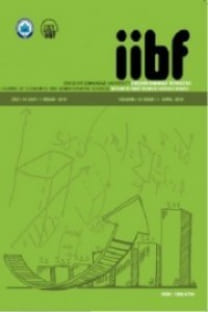Karl Marx and Ralf Dahrendorf: A Comparative Perspective on Class Formation and Conflict
Karl Marx ve Ralf Dahrendorf: Sınıf Oluşumu ve Çatışma Üzerine Karşılaştırmalı Bir Bakış Açısı
___
- Ashley, D. and Orenstein, D. M. (1998), Sociological Theory: Classical Statements, Boston: Allyn and Bacon.
- Aspers, P. (2010), Alfred Marshall and The Concept of Class, American Journal of Economics and Sociology, 69(1), 151‐165.
- Barteck, L. and Mullin, K. (1995), Enduring Issues in Sociology: Opposing Viewpo‐ ints, CA: Greenhaven Press.
- Coser, L. A. (1956), The Functions of Social Conflict, New York: The Free Press. Coser, L. A. (1977), Masters of Sociological Thought, New York: Harcourt Brace Jovanovich.
- Dahrendorf, R. (1958), Toward A Theory of Social Conflict, The Journal of Conf‐ lict Resolution, 2 (2), 170‐183.
- Dahrendorf, R. (1959a), Class and Class Conflict in Industrial Society, California: Stanford University Press.
- Dahrendorf, R. (1959b), Power Division as The Basis of Class Conflict, Ed. R. Collins, Four Sociological Traditions: Selected Readings, Oxford University Press.
- Foster, J. (2010), The aristocracy of Labour and Working‐Class Consciousness Revisited, Labour History Review, 75(3), 245‐262.
- Girdner, E. J. (2006), Neoliberalism and Class Formation on A Global Scale, Natu‐ re, Society, and Thought, 2(19), 225‐232.
- Hanieh, A. (2010), Khaleeji‐Capital: Class‐Formation and Regional Integration in The Middle‐East Gulf, Historical Materialism, 18, 35‐76.
- Hazelrigg, L. E. (1972), Class, Property, and Authority: Dahrendorf's Critique of Marx's Theory of Class, Social Forces, 50 (4), 473‐487.
- Lachmann, R. (2002), Comparisons within A Single Social Formation: A Critical Appreciation of Perry Andersons Lineages of The Absolutist State, Qualitative Sociology, 25(1), 83‐92.
- Marx, K. and Engels, F. (1845), The German İdeology, New York: International Publishers.
- Marx, K. and Engels, F. (1848), The Communist Manifesto, New York: Signet Clas‐ sic.
- Marx, K. (1850), The Class Struggle in France, 1848 to 1850, http://www.marxists.org/archive/marx/works, (Erişim: 17.11.2009).
- Marx, K. (1852), The Eighteenth Brumaire of Louis Bonaparte, www.marxists.org/archive/marx/works/1852/18th‐brumaire/ch07.htm, (Erişim: 11.11.2009).
- Marx, K. (1859), A Contribution to The Critique of Political Economy, New York: International Publishers.
- Marx, K. (1875), Critique of the Gotha Programme, http://www.marxists.org/ archive/marx/works, (Erişim: 16.11.2009).
- Marx, K. (1989), Critique of the Gotha Programme by Karl Marx with the Appen‐ dices by Marx, Engels and Lenin, New York: International Publisher Co., Inc.
- Marx, K. (1894), Capital, Volume III., http://www.marxists.org/archive/ marx/works, (Erişim: 09.11.2009).
- Robinson, W.I. and Harris, J. (2000), Towards A Global Ruling Class? Globalization and The Transnational Capitalist Class, Science & Society, 64(1), 11‐54.
- Robinson, R. V. and Kelley, J. (1979), Class as Conceived by Marx and Dahrendorf: Effects on Income Inequality and Politics in The United States and Great Britain, American Sociological Review, 44(1), 38‐58.
- Sprey, J. (1969), The Family as A System in Conflict, Journal of Marriage and the Family, 31, 699‐706.
- Straus, M.A.(1979), Measuring Intrafamily Conflict and Violence: The Conflict Tactics (CT) Scales, Journal of Marriage and Family, 41(1), 75‐88.
- Tucker, R. C. (1978), Marx‐Engels Readers, New York: W.W. Norton &Company Ltd.
- Weingart, P. (1969), Beyond Parsons? A Critique of Ralf Dahrendorf's Conflict Theory, Social Forces, 48(2), 151‐165.
- Wright, E. O. (2002), The Shadow of Exploitation in Webers Class Analysis, American Sociological Review, 67, 832‐853.
- ISSN: 1306-6730
- Yayın Aralığı: Yılda 3 Sayı
- Başlangıç: 2006
- Yayıncı: Eskişehir Osmangazi Üniversitesi İktisadi ve İdari Bilimler Fakültesi
Disiplinler arası Bir Saha Olarak İktisadi Arkeoloji: Yöntemi ve Alt Disiplinleri
İbrahim bakirtaş, Güner tuncer, Ümit yiğit
Sosyal Sermayenin İşgücü Piyasası Üzerine Etkileri: Panel Nedensellik Analizi
Cemil serhat akin, Cengiz aytun
Karl Marx and Ralf Dahrendorf: A Comparative Perspective on Class Formation and Conflict
Tüketicilerin Fiyat Hatırlama Doğruluğu ile İlişkili Faktörlerin Belirlenmesi
Karl Marx and Ralf Dahrendorf: A Comparative Perspective on Class Formation and Conflict
Terör ve Terörle Mücadeleden Doğan Zararların Karşılanması Hakkında Kanun, Uygulanması ve Etkileri
Durdu mehmet biçkes, Celal yilmaz, Özgür demirtaş, Ayşegül uğur
Reel Çıktıdaki Dalgalanmalar Geçici mi yoksa Kalıcı mı? OECD Ülkeleri için Bir Panel Veri Analizi
Ekonomik Özgürlükler ve Ekonomik Büyüme Arasındaki İlişkinin Panel Regresyon Yöntemiyle İncelenmesi
